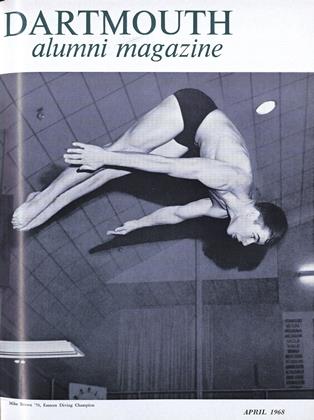If you have never read King Lear, the short story "Storm Still" by Brock Brower '53 may mean little to you, but English majors and especially English teachers may express amazement at its brilliance. How brilliant? The 1967 Tri-Quarterly accepted it, and it is reprinted in Prize Stories 1968 the O. Henry Awards, Doubleday's annual literary event going back to 1919. The action opens with a 1967 professor at a performance at the Globe in 1608 with Robert Arnim playing the fool and getting brutally whipped. The theatre burns down. But it was only a dream. In the real world of 1967 the story treats the fatuous contretemps of faculty relations with the focus on a retired scholar about one-third decayed king and two-thirds wise fool, who is going through erudite literature relating to fools and Folly. The story ends with his understanding that loneliness for him, now retired, has no .boundaries and that he must accept this dreadful pronouncement as wisdom. His bearded young assistant, a realist, will write the book which the otherworldly professor could not because Lear's fool as puckish ghost mocks him in everything he does or thinks. First prize in the contest went to that old pro and favorite of The New Yorker, Eudora Welty, for "The Demonstrators." Second to E. M. Bronner, a woman teaching at Wayne University, with "The New Nobility" from Epoch. Third to a man, Shlomo Katz, with "My Redeemer Cometh" from Midstream, the magazine which he edits.
Neil R. Bersch '53, a partner in the national accounting firm of Touche, Ross, Bailey and Smart, and Donald H. Woods '55, Professor of Finance in the Graduate School of Business Administration, UCLA, are authors of two essays in The Financing ofSmall Business, A Current Assessment. This is a volume in Studies of the Modern Corporation issued in 1957 by the Columbia Graduate School of Business and the Macmill an Company.
In "Tax Incentives for Small Business,' Mr. Bersch recommends a variety of decision rules relating to choice of fiscal year, accounting basis, legal forms of organization, and tax planning which suggests that one major technique for increasing after-tax income is to minimize tax exposure. He offers numerous strategies for reducing the burden of taxation for small firms. Professor Woods provides an economic analysis of the Small Business Investment Act which points up the need for more rational policies in providing incentives for efficient and growing firms. He demonstrates the economic inconsistency in present leverage limitations in the law. Edited by Prof. Irving Pfeffer of UCLA, the volume offers new insights for economists analyzing small businesses, for small businessmen seeking advice for financing problems, for government officials desiring an objective perspective, for CORE needing guidelines in counselling, and for entrepreneurs requiring a map of problem areas in financing small businesses.
Edited by Prof. Jacob Neusner of Dartmouth, two books have emerged from 1965 Dartmouth Comparative Studies Center Seminar. The first is the 200-page Report ofthe 1965-1966 Seminar on Religions in Antiquity, consisting of bibliographies and transcriptions of lectures and discussions during the 23 sessions involving 35 American, European, and Israeli scholars. The second is Religions in Antiquity: Essays inMemory of Erwin Ramsdell Goodenough published by E. J. Brill, Leiden, Holland, in Supplements to Numen, Journal of the International Association of the History ofReligions. The 700-page volume contains essays on the history of religions in the ancient Middle East, religious symbolism, and biblical studies. Besides Mr. Neusner, authors include Robin J. Scroggs, Chairman of the Department of Religion at Dartmouth, and two former members of the Dartmouth faculty, Jonathan Z. Smith and Wayne A. Meeks.
"The most charming man you ever met - unless he has had a bad day. Then he may be the most difficult S. O. B. you ever met."
Who? The Author, Architect, Cartoonist, Silversmith, Merchant, Pioneer Sailor, Aviator, Tropical Horticulturalist, Expert on Medicinal Plants, Pre-Columbian Authority, and Central American Collector.
Who? The source for biographers wanting a first-hand account of American writers (William Faulkner, Hart Crane, Roark Bradford, Stuart Chase, Sherwood Anderson, and John Dos Passos), or Mexican artists (Miguel Covarrubias, Diego Rivera, David Alfaro Sigueiros), or internationalists (John Huston, Audrey Hepburn, and Nelson Rockefeller '30).
Who? The Cellini from Alabama, the Renaissance Man, William Spratling (1900-1967), killed in an automobile accident near his ranch in Taxco, Mexico.
Budd Schulberg '36 has written an introduction to File on Spratling, An Autobiography, 235 pages, published by Little, Brown and Company, Boston, 1967, with a jacket design by Spratling, a jacket painting by David Sigueiros, and with drawings by Spratling of Sherwood Anderson and Faulkner, a Guerrero stone mask, a young boy reclining and another with a mask, a silversmith, a Mexican woman, and a landscape of Cuernavaca.














